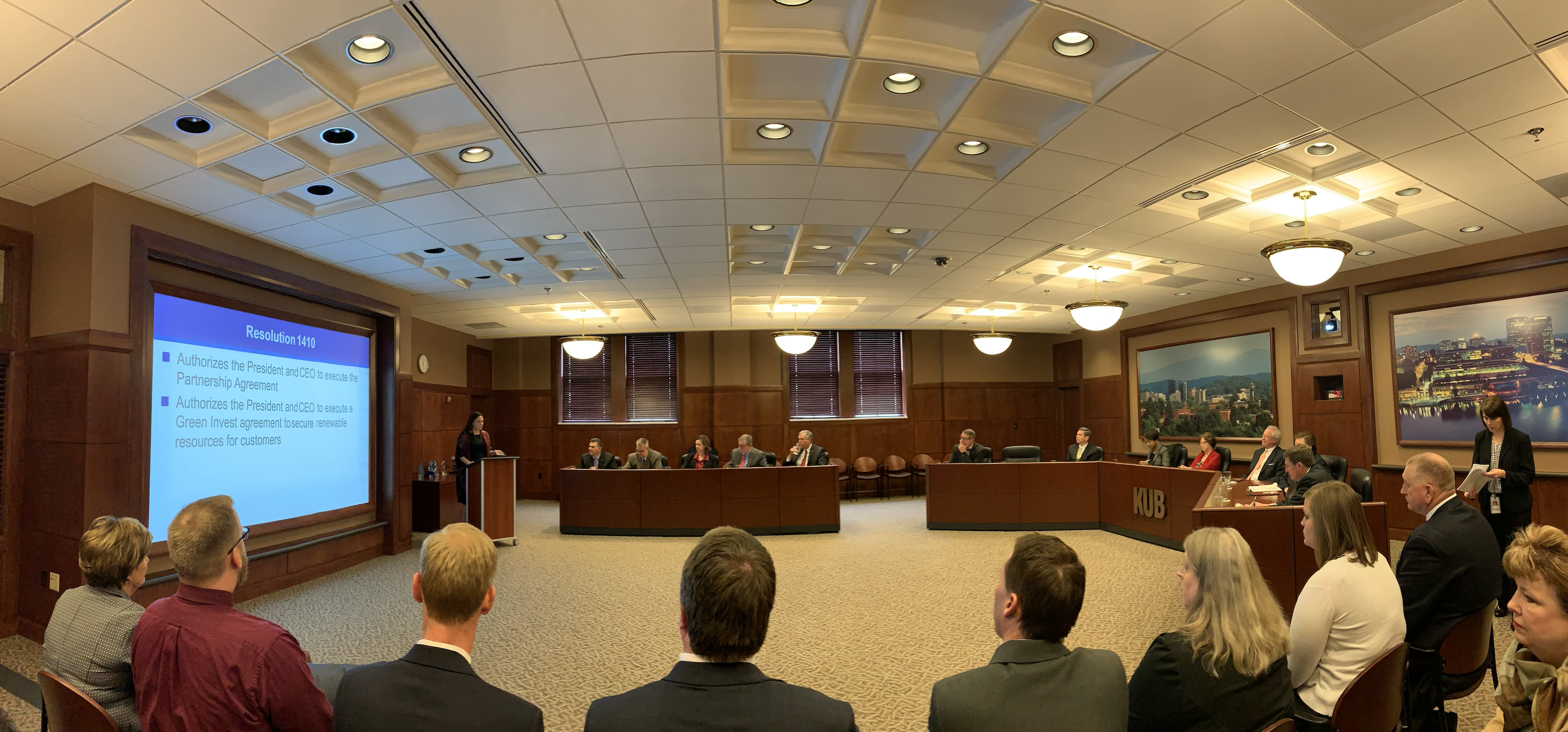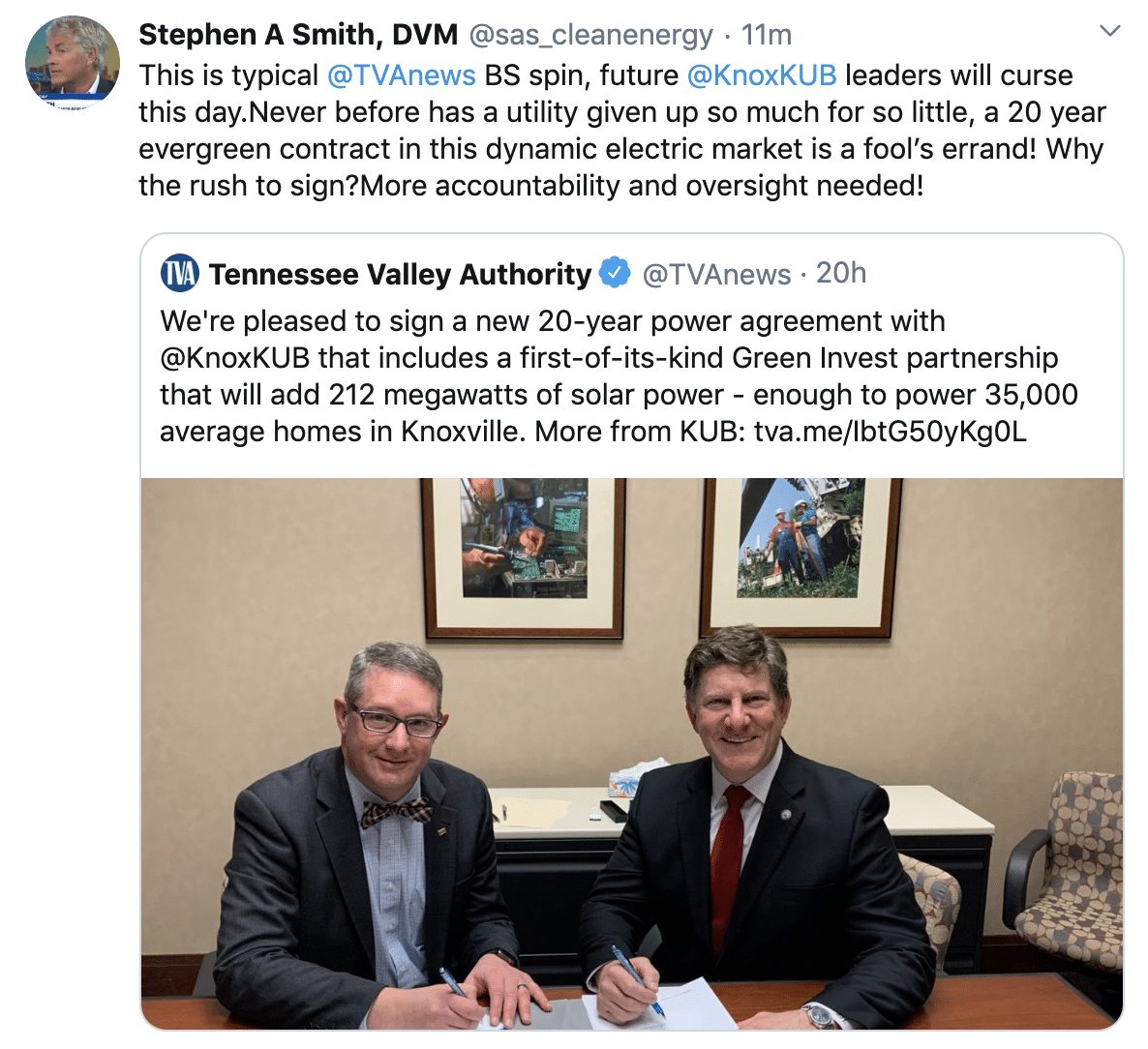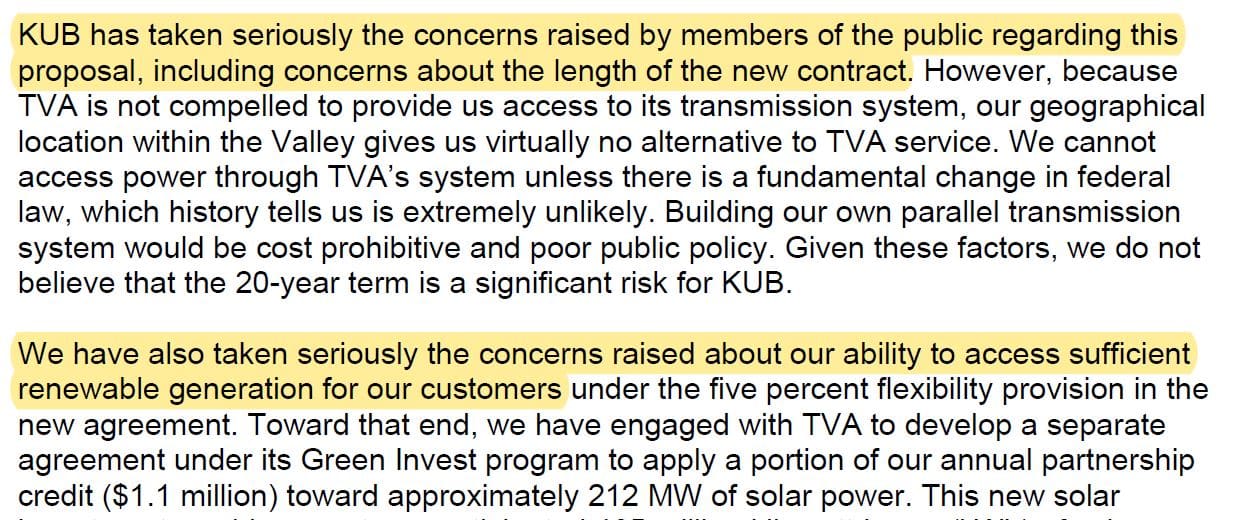The ink is drying on two major contracts Knoxville Utilities Board (KUB) entered in with Tennessee Valley Authority (TVA) on Thursday:
- A multi-decade contract for KUB to purchase power from TVA (page 7), and
- A contract to allow KUB to participate in TVA’s new “Green Invest” program (page 12)
Last summer TVA’s board of directors approved the utility’s long-term resource plan on what energy resources the utility will use to power its service territory. Since the approval of the plan, TVA has been pursuing 20-year self-renewing contracts with local power companies (LPCs) across the region.
While KUB has had this contract in front of them since August of 2019 and have led us at the Southern Alliance for Clean Energy (SACE) and City of Knoxville elected officials to believe that they would hold off signing until they had more information on significant factors in play unfolding across the Tennessee Valley – this week KUB signed and locked its customers into TVA despite potential future savings and opportunities for clean energy.

We at the SACE, have some serious concerns about these contracts and voiced them in a previous blog post. These concerns remain, but it appears KUB has decided to accept the bad and the ugly in order to get something good: access to clean and affordable renewable energy for its customers.

The Good
TVA has agreed to pursue approximately 212 megawatts (MW) of solar for KUB and pass the clean energy and financial savings onto KUB customers. According to our calculations, this 212 MW of solar would serve about 7% of KUB’s annual electricity sales to customers. TVA conditioned this solar deal on KUB signing the 20-year, self-renewing contract. As part of the contract, TVA will give KUB a 3.1% credit on wholesale rates for the first 20 years, estimated by KUB to be approximately $9.5 million per year. Part of that credit ($825 thousand per year) will go towards KUB’s proposed solar deal. The remaining approximately $8.7 million per year holds the potential to help KUB customers lower electric bills if KUB chooses to invest part of all of it in energy efficiency like home weatherization. KUB staff are still evaluating what they will do with the remainder of the credit. At Thursday’s Board meeting, KUB President Gabe Bolas listed reliability improvements, deferral of rate increases, low-income assistance, environmental investments, and other electrical system needs as possible items the credit could be spent on.
The potential solar deal, as presented by KUB, would be positive for Knoxville residents. Its fruition shows that KUB is listening to its customers, stakeholders and Knoxville voters, who all want to benefit from low-cost, clean solar energy.

The potential for an influx of solar into Knoxville is positive, but we still have questions about what KUB will do in regard to energy efficiency investments for Knoxvillians who earn lower incomes and struggle with energy affordability.
The Bad
Why the rush?
TVA’s largest customer, Memphis Light, Gas & Water (MLGW) is seriously looking at leaving the TVA system. Other large LPCs are looking for greater contract flexibility and better overall power supply contract terms and are not signing the contracts as they contemplate leaving the TVA system. This will have serious rate implications going forward for those that remain on the TVA system and/or this could lead to more concessions by TVA giving local power companies greater contract flexibility and better overall contract terms.
We fundamentally disagree with the premise of TVA’s multi-decade, evergreen (self-renewing) contract. The contract obligates KUB to buy nearly ALL of its power (~99% of its energy and 95% of its capacity) from TVA for at least 20-years and since it self-renews, the 20-year timer is reset every day. A contract of this duration leaves KUB with little leverage to bring TVA back to the table to renegotiate another contract, and it goes against the way the energy market is moving.
We are in a time of rapid innovation in the energy sector, with dramatic changes in energy economics. For example, the cost of solar energy has declined in price by 89% over the past ten years and the cost of wind energy has declined by 70%. In such a rapidly changing market, getting locked into 20+ years of energy supply with a fossil-reliant energy supplier could leave savings on the table for KUB and for its customers.
The now-signed long-term contract will allow KUB a small amount of flexibility with which to source energy coming from non-TVA sources, but it is a very minor amount.
We fundamentally disagree with the premise that TVA should not be required to provide access to its transmission lines to local power companies to provide cost savings and cleaner, better generation options to customers in the Valley. We anticipate that there could be legal challenges in front of the Federal Energy Regulatory Commissions to TVA’s current closed stance on its transmission lines in the near future. KUB has effectively removed its customers from being able to benefit from these actions for at least the next 20 years.
KUB had previously said it would not consider the long-term contract with TVA until Memphis completes its evaluation of whether to seek alternative, low-cost energy from a source other than TVA. That evaluation is still in process, and how it concludes could send shock waves across the TVA system, and leave KUB with regrets about signing too early.
The Ugly
The process leading up to this decision has been a disaster. The contract was voted on by only five of the seven KUB Board Members during the middle of the day at KUB’s downtown office, after being posted for public review for less than a week. Aside from three community speakers at KUB’s Board meeting, there was no other opportunity for the public to comment on the contract, and many Knoxvillians will be left completely in the dark about a long-term contract that will impact them for generations. The people of Knoxville deserve ample time to review it and ask questions. Both citizens and elected officials were misled about the timing of this decision. There is no need to rush a decision of this magnitude.
What We Still Don’t Know
This process and these contracts open up more questions than provide answers. Here are the major questions we are looking for KUB to clarify to its customers:
- Why the rush to push through this decision?
- What is KUB’s plan for providing information to its customers about both of these contracts?
- How does KUB expect to allocate the remaining $8.7 million rate credit from TVA?
- How will the output from the 212 MW of solar be allocated: to all KUB customers or dedicated to customers in the City of Knoxville to meet climate goals? If it is allocated to all KUB customers, how will that impact the City’s ability to meet its climate goals?
- Ultimately, what does all this mean for KUB customers’ electric bills?
By signing the long-term contract with KUB is penny-wise but pound foolish.
Stay tuned as we continue to track this issue and inform KUB customers on when and how they can raise their voices to continue to advocate for a better energy future with meaningful public participation.
Live in Knoxville? Raise your voice and let local leaders know you want them to prioritize clean energy and energy efficiency in Knoxville’s City budget.